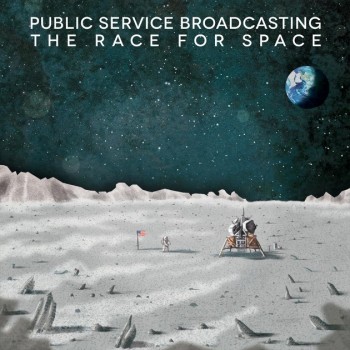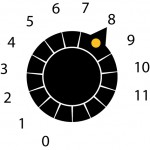 Public Service Broadcasting is a band that ought not to be able to release more than one album. The formula of putting music to samples of archive footage is something at first arresting; it’s the sort of simple-but-effective idea you can’t believe nobody has exploited properly before. However, having heard the band’s fascinating debut record – 2013’s Inform – Educate – Entertain– it is difficult to see how the band could build on such a formula to the extent where another full-length album could seem necessary. It feels as if an excellent idea has already been seen through to fruition to a remarkable standard. In short, what more could PSB have to offer without deviating from their established style almost completely?
Public Service Broadcasting is a band that ought not to be able to release more than one album. The formula of putting music to samples of archive footage is something at first arresting; it’s the sort of simple-but-effective idea you can’t believe nobody has exploited properly before. However, having heard the band’s fascinating debut record – 2013’s Inform – Educate – Entertain– it is difficult to see how the band could build on such a formula to the extent where another full-length album could seem necessary. It feels as if an excellent idea has already been seen through to fruition to a remarkable standard. In short, what more could PSB have to offer without deviating from their established style almost completely?
Bearing these suppositions in mind, then, Public Service Broadcasting’s decision to narrow down their focus for the second LP The Race For Space may seem something of a surprise. The second record sheds the catch-all approach to subject matter displayed on the group’s début and presents those listening with an in-depth exploration of the titular topic. PSB’s début exhibited shrewd ability in selecting interesting snippets of historical broadcasts on a variety of topics and using them to construct a clear introduction to the band’s USP. What The Race For Space does is take that USP further, demonstrating how it can not only introduce people to interesting snap-shots of cultural history but take people on an insightful journey exploring a topic at length and from numerous perspectives.
Consequently, it is the educate element of the band’s explicitly-stated ethos that seems the most prominent motive behind the making of this record. Whilst lead-single ‘Gagarin’ hinted at a broader use of instrumentation – the track brilliantly incorporates a sizeable brass section in a manner that is missed amongst the tracks on the album which follow – the musical element to PSB remains similar to that on their older releases. The eponymous album opener contains JFK’s “We choose to go to the Moon…” speech to make clear the main drive behind this album; the tracks that follow serve in part as an extension of this rhetoric and succeed in genuinely exciting the listener’s interest in the topic which PSB have chosen to cover. ‘Sputnik’ follows the dialogue-heavy opener, setting the tone of discovery and the unknown with muted percussion and ominous bleeps set against droning synths that ebb and flow as the song gradually gains momentum. The archive material played over the top reveals the hopefulness felt by those invested in the early space missions and its careful layering over the music as it builds succeeds in its role of constructing an atmosphere of genuine anticipation. This anticipation is realised with the aforementioned explosive ‘Gagarin’, where the opening drum roll and horn section give way to the most memorable hook on the record.
The album’s highlight comes in the middle, with centrepiece tracks ‘E.V.A.’ and ‘The Other Side’. The former – an homage to the first astronauts to move in space outside of the vehicles they travelled in – captures the significance of the moment it depicts. This historical amazement and apprehension is made further use of in ‘The Other Side’, which charts the progress of Apollo 8 as it explored the far side of the moon for the first time. The music matches the mood of the people who feature in the archive recordings as they lose signal with the craft, indulging in their relief and elation when contact is re-established and success is realised. It is in adding their atmospheric music to documented moments like these that Public Service Broadcasting achieve what they exist to do the most emphatically. In listening to this, it is almost impossible not to feel some kind of investment in the events that are being told.
The album does have some significant weak spots. Where ‘Gagarin’ adds welcome variety to the usual sound of the band – in such a way that, after hearing the first single the lack of much other musical deviation from the style of the band’s début can feel a little disappointing – The Smoke Fairies collaboration ‘Valentina’ feels pointlessly different. It feels like the band have eschewed what they are good at completely, using what they know about the first woman in space as inspiration for a song that feels only vaguely related. PSB are at their best when they are explicit about their source material, and allow those listening to enjoy the acquisition of knowledge that the band have obviously enjoyed in creating the songs. At times, the album can feel like it goes too far the other way. ‘Fire In The Cockpit’ is an unnecessary break in the record’s momentum that informs, but does little to evoke the sense of tragedy that the archives exist to record.
On the whole, however, the members of Public Service Broadcasting succeed in using their original formula to once again create an interesting and exhilarating piece of work. It is impossible to listen to this album and not want to delve deeper into the history behind space travel. Not only is the album interesting; it is very listenable. At times it is genuinely exciting. Although the very nature of PSB no doubt makes them an acquired taste, The Race For Space reaffirms the fact that they are utilising interesting material and breathing new life into it. For this reason, they deserve to be considered and commended.
Release Date 23/02/2015 (Test Card Recordings)
Public Service Broadcasting Official | Facebook | Twitter | Soundcloud

















